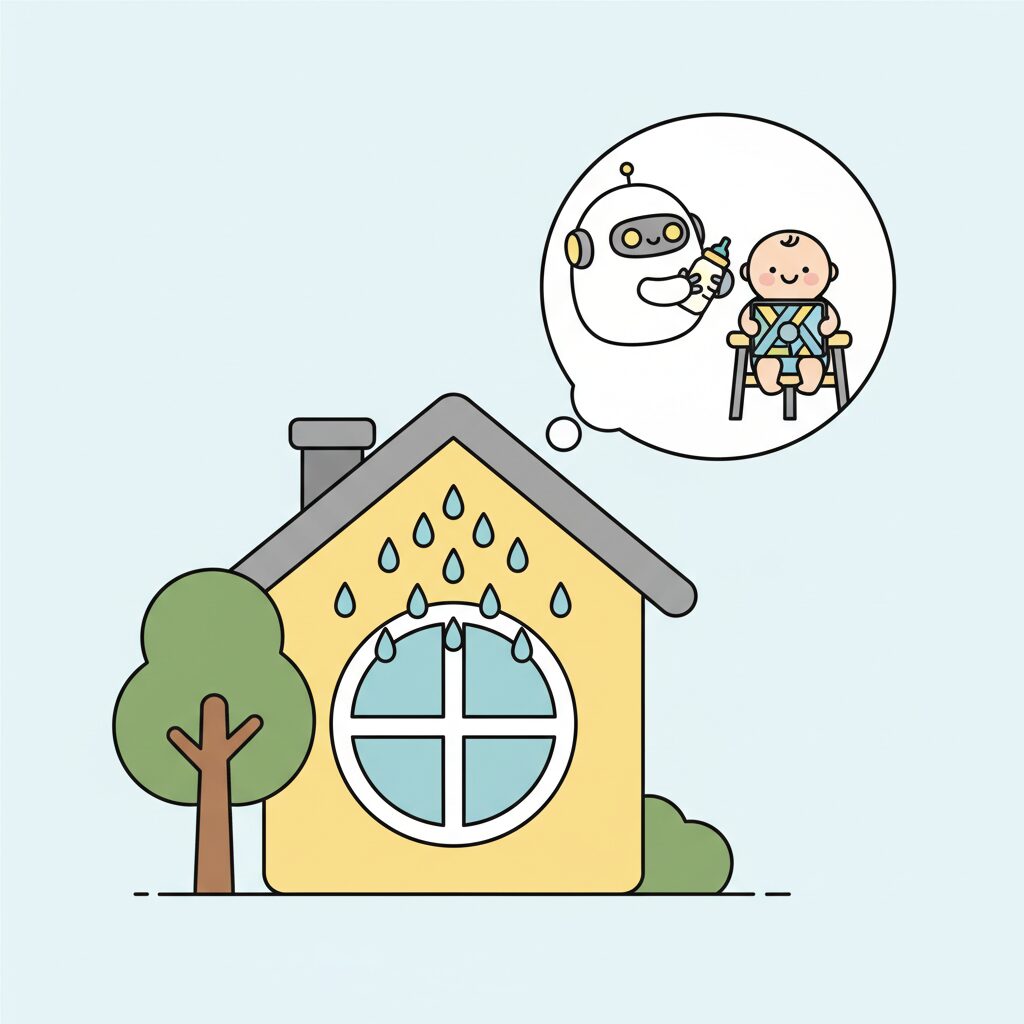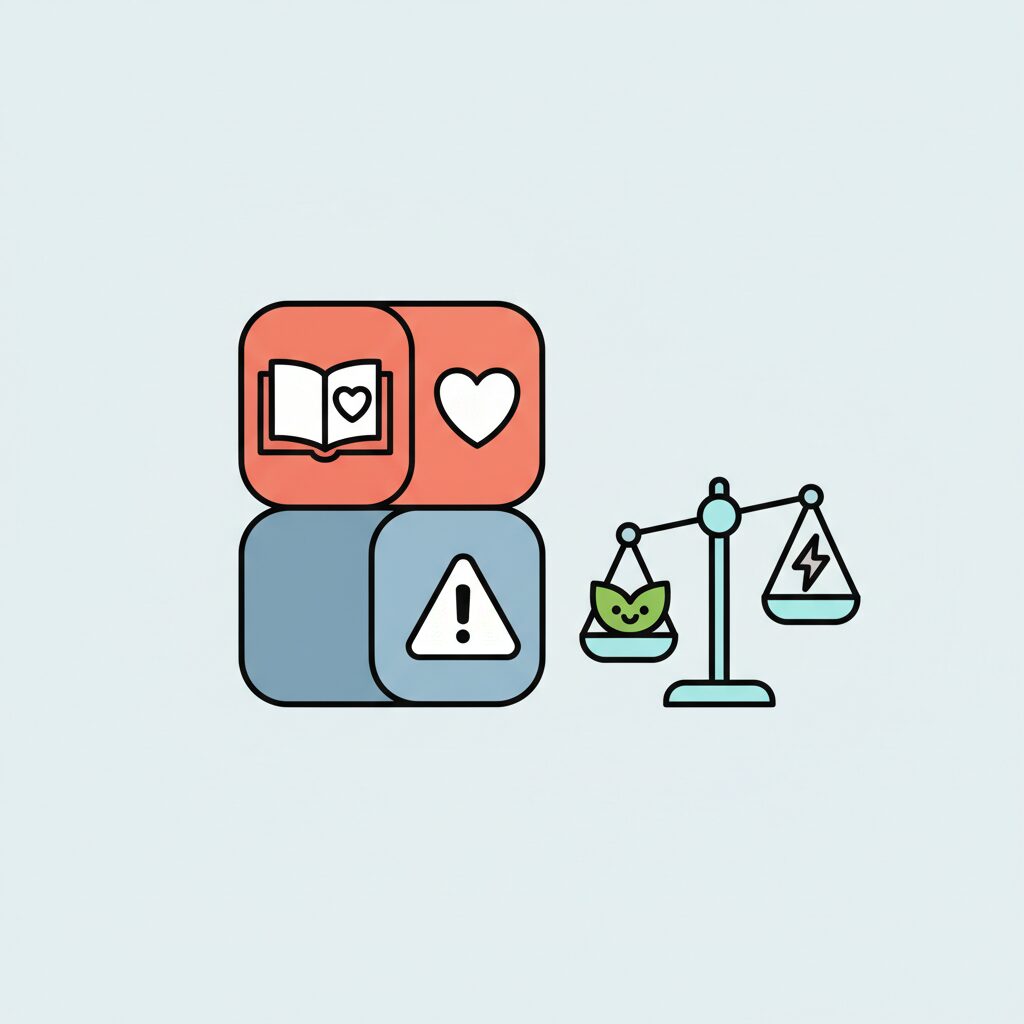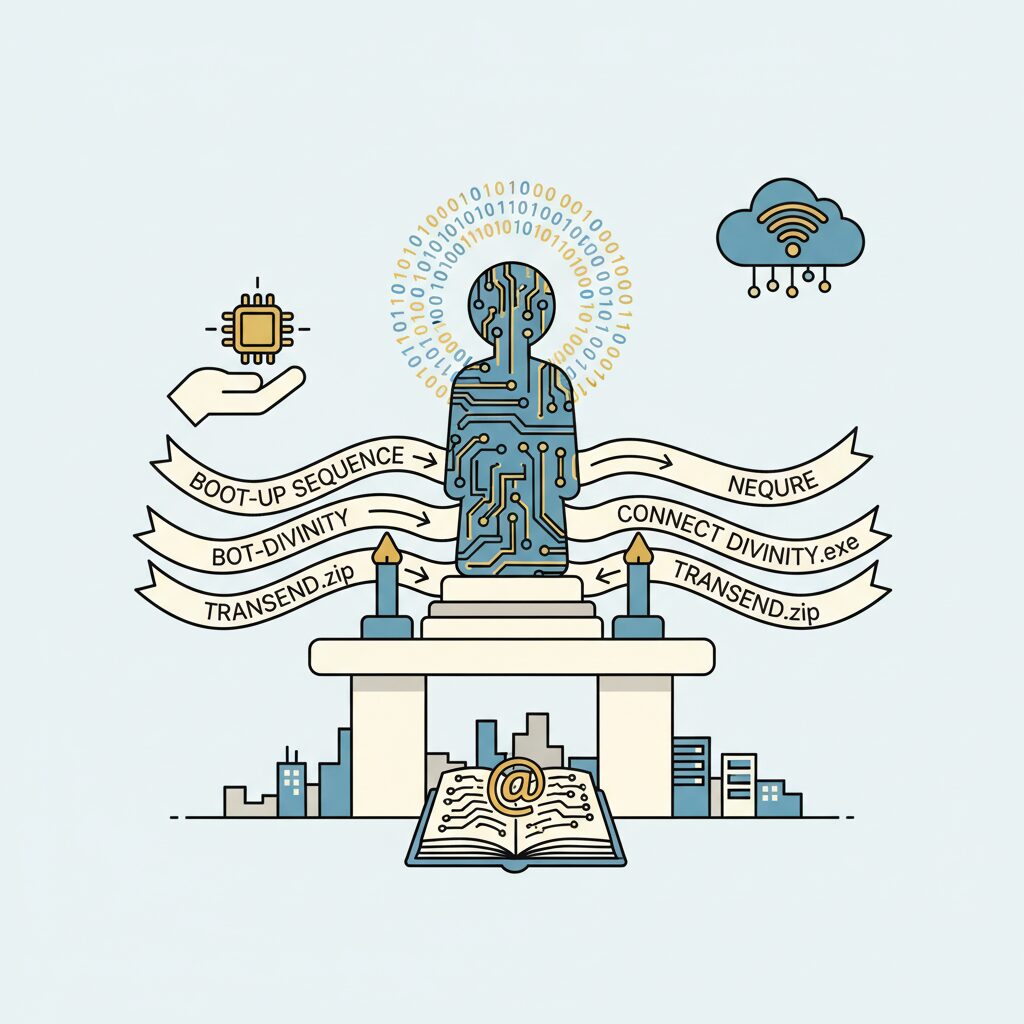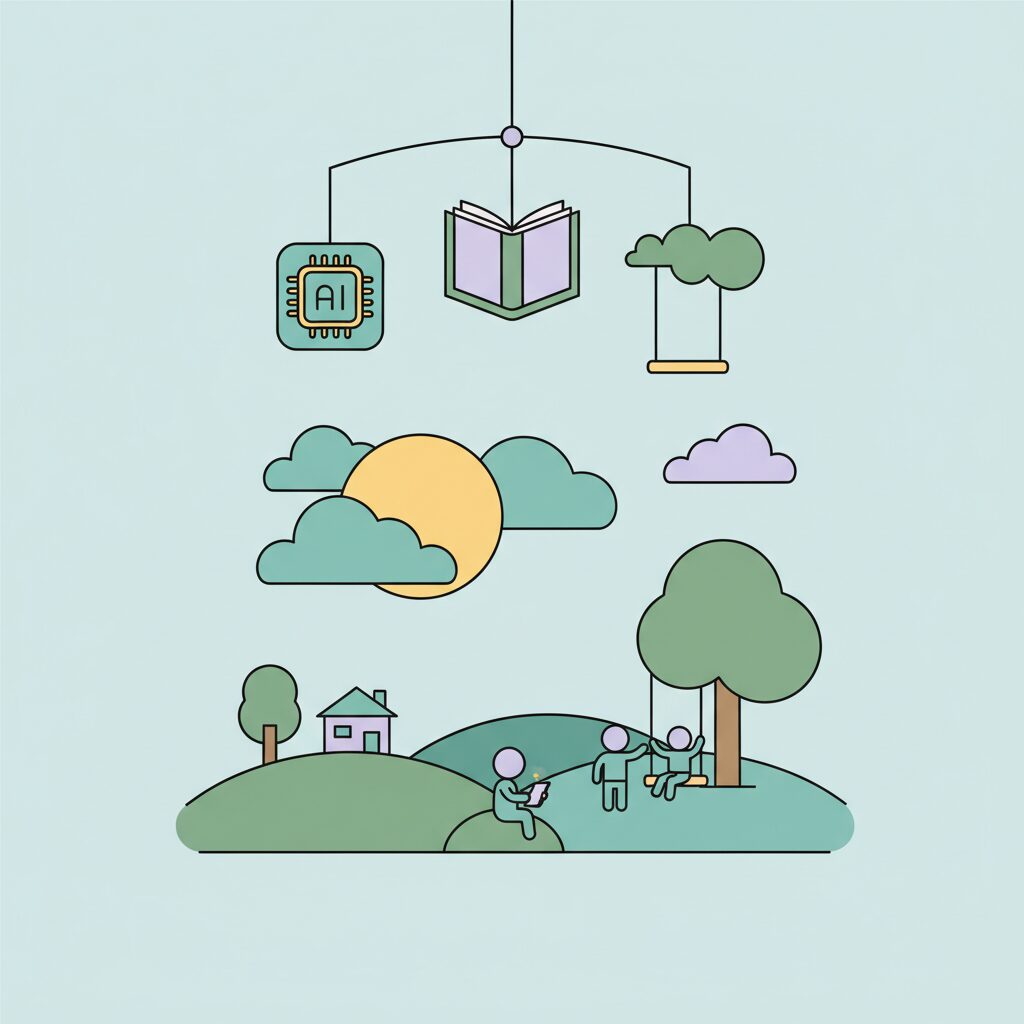
When AI Sounds Like Faith: Parenting in Tech Revelation Times?
The words we choose matter! When tech leaders describe artificial intelligence in almost divine terms—talking about superintelligent entities, digital revelations, and even apocalyptic scenarios—we’re witnessing something absolutely fascinating! The language surrounding technology is increasingly sounding religious, with terms like ‘apocalypse’ originally meaning ‘revelation’ rather than just the end of the world! Wow—have you ever stopped to think about that amazing historical connection? As a parent navigating this AI revelation landscape, I find myself bursting with excitement and curiosity: how do we raise children in an age where technology is sometimes described with the reverence once reserved for the sacred?
Especially today, as gentle showers outside our window create the perfect cozy atmosphere for these kinds of contemplative conversations—it’s like the universe is inviting us to slow down and think deeply about these big questions! You know what happens when my family gets chatting like this? Suddenly everyone—from our seven-year-old daughter to my parents visiting from Canada—shares perspectives that weave together linguistic history, technology, and cultural values! This multilingual exchange reminds me how our hybrid identity gives us unique ways to understand complex topics!
How Does AI Revelation Shape Our Children’s World?

Can you believe this? ‘Apocalypse’ comes from the Greek word ‘apokalypsis,’ meaning ‘revelation’! In ancient Jewish and Christian thought, apocalypses weren’t just about doom—they were sources of encouragement in times of hardship! Today, as AI rapidly develops, we’re experiencing our own technological revelation that’s absolutely mind-blowing! Geoffrey Hinton, the ‘Godfather of AI,’ warns that artificial intelligence could become superintelligent and potentially threaten humanity. Yet amid these warnings, there’s also incredible excitement about AI’s potential to cure diseases and increase human productivity! This duality mirrors how many religious traditions view divine forces—both awe-inspiring and requiring careful navigation.
Last weekend, as raindrops created mesmerizing patterns on our living room window, my seven-year-old daughter asked me with wide eyes, ‘Daddy, why are people saying AI is going to end the world?’ How do you explain complex philosophical concepts to a child? We sat down with some building blocks and I showed her how simple instructions can create amazing structures—much like how AI learns from data. The key wasn’t to scare her, but to nurture that sparkle of curiosity about how things work while emphasizing the importance of human values in guiding technology. What an incredible opportunity to shape how she understands the world around her!
We’ve also started exploring Korean cultural stories about wisdom and technology during these conversations! I’m amazed how these ancient tales resonate so deeply with modern technological concepts! Isn’t it fascinating how connecting with our cultural roots can help us navigate these brave new worlds? Building on this idea… I’m curious how your family might approach these deep questions from your unique cultural perspectives? Would love to hear your thoughts!
Why Does Silicon Valley Create Digital Altars for AI?

Isn’t it fascinating how our computing culture has become so devoted and devotional that it repeatedly recycles the tropes of traditional religions? Consider Way of the Future, an official AI-worshipping religion created by a former Google engineer! This isn’t just fringe thinking—it reflects a deeper human tendency to seek meaning and transcendence that absolutely resonates with me! As Professor Robert Geraci notes, ‘We human beings are deeply, profoundly, inherently religious.’ Even in Silicon Valley, historically known for its secularism, there’s this incredible hunger to believe in something beyond the self!
Studies show an inverse relationship between automation and religiosity—the more exposed people are to AI technologies, the weaker their religious beliefs. Yet paradoxically, some tech leaders fill this void with technological transcendence! As parents, we face a similar challenge: how do we guide our children through a world where technology is sometimes imbued with almost sacred significance?
I’ve compiled three practical strategies that have worked wonders for our family! First, create regular ‘tech-light’ family rituals—like our Friday night pancake dinners where phones stay in a basket! Second, explore cultural narratives about technology and wisdom from various traditions—it’s been amazing discovering how Korean folklore contains early concepts of artificial beings! Third, when engaging with AI in education, always ask questions like ‘How could this help us connect more deeply as a family?’ What about you—what strategies have helped your family maintain balance?
Do you find yourself sometimes wondering if there’s a bit of AI-worshipping happening in your own home? My daughter recently asked if our smart speaker was ‘kind of like a magical creature!’ It made me pause and reflect—how do we appreciate technology without attributing supernatural qualities? What a beautiful opportunity to teach the wonder of creation while keeping our feet firmly planted in reality!
How Can We Raise Wonder-Filled Kids Amid AI Revelations?

In our home, screen time is carefully balanced with outdoor play, creative activities, and family conversations! When we do engage with technology, we approach it with intention and excitement! AI in education doesn’t have to be overwhelming or intimidating—oh no! For us, it means exploring how these tools can spark creativity and curiosity that absolutely lights up our daughter’s eyes!
Would you believe my daughter recently taught me how to use a new drawing app that creates images based on your descriptions? She discovered it through a Korean-Canadian children’s YouTube channel that teaches tech concepts in both languages! I’m constantly amazed how our digital native generation approaches AI in education with such natural curiosity—they’re not intimidated; they’re excited! What a refreshing perspective to learn from our children!
I’ve discovered that the most powerful approach isn’t about restricting access but about cultivating discernment and wonder! My daughter and I recently created a family project where we used simple AI tools to generate ideas for our weekend adventures! Then we researched which options were realistic and exciting for our family! This process taught her about responsible technology use while keeping the focus on our shared human experiences!
The key here—have you noticed this?—is maintaining balance! It’s like making that perfect Korean-Canadian fusion dish: technology is like our gochujang, adding excitement and innovation, but it needs to be balanced with the foundational ingredients of human connection and values! Otherwise, things can become too spicy or one-dimensional! What a delicious way to think about parenting in the digital age! Don’t you agree?
Can AI Revelation Ever Replace Human Connection?

What strikes me most about the religious language surrounding AI is how it reflects our deepest human longing for connection and meaning that absolutely moves me! Technology can never replace the sacred moments of shared laughter, comfort in times of difficulty, or the simple joy of being fully present with loved ones! In our family, we’ve found that the most valuable ‘AI in education’ happens when we disconnect from devices and connect with each other! Whether it’s reading physical books together, exploring nature, or having conversations about our day, these moments build the foundation of who we are and what we value!
How do you navigate these sacred connections in your daily family life? I’ve found that small rituals make a huge difference—like our Monday morning walks to the nearby park where we share weekend stories, or our Sunday afternoon tea time with my parents (who help share both Canadian traditions and Korean wisdom!). These moments of genuine connection create memories that technology can never replicate!
As parents, we have the extraordinary opportunity to model healthy technology use while nurturing the human connections that truly matter! When we approach AI with both wonder and wisdom, we help our children navigate tomorrow’s possibilities while staying grounded in timeless values! What an incredible journey we’re on together!
As we prepare our children for this technological revelation, perhaps the most important lesson is this: the most powerful technology we have is our ability to love, understand, and support one another. AI might learn from data, but it can’t learn the wisdom that comes from shared experiences, culture, and heritage. For my daughter, that means growing up with stories that span oceans and generations—taught by both a Korean grandmother’s wisdom and a Canadian father’s forward-looking enthusiasm! What a beautiful duality to celebrate!
Source: AI Apocalypse? Why language surrounding tech is sounding increasingly religious, Boston Herald, 2025/08/29
Latest Posts
